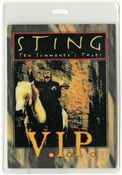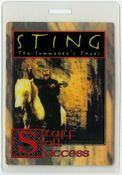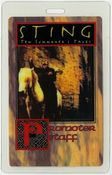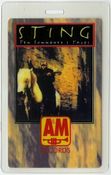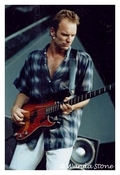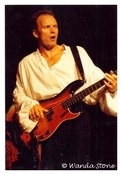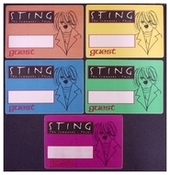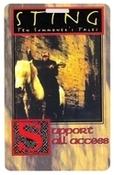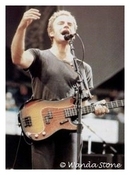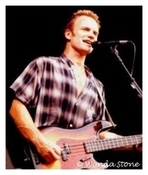
Sumner in the City. Sting on tour with new songs and a new image...
A strange fellow travels the country every few years, stopping here and there to tell his stories. Many go and listen and marvel. This time, too. In a simple black suit, his blond hair, forced back with difficulty, nodding tactfully, his string instrument like a tray on his doublet, he steps before the crowd and begins his first bumpy melody: If I ever lose my faith in you / There'd be nothing left for me to do.
He certainly doesn't have to worry about that. For years, he's been able to present people with almost anything, from nursery rhymes to world revolutions - no matter what. Crowds at record stores and concert arenas are guaranteed. To kick off this year's tour, he fills the Hamburg Sporthalle twice.
Some call him a brazen braggart, others a wondrous genius. He calls himself Sting. Not because it sounds sophisticated; his playmates had already called him that because of his penchant for yellow and black sweaters. A few years ago, he was still playing in a band called Police. It was neither visionary nor otherwise significant, but still quirky and original in its own way – and, above all, especially coincidentally, amidst the turmoil of the post-punk era, particularly successful. Thus, Sting, the band's leader and composer, was suddenly proclaimed a revolutionary leader and bellwether of a new generation. This has gone to his head a bit, because ever since the Police ended, he's presented himself as a supposedly restless innovator and pop star for the discerning (Zeit magazine). Musically, this has meant, above all, a helpless and artful fiddling around in the cliché box. Otherwise, a rather overly artificial bohemian attitude, accompanied by a constant concern about the injustices of this world.
Now, as his latest CD and his new stage show demonstrate, he's finally returning to his core skills: He neither tries to follow trends, let alone set them, nor convey grand ideas to the masses – he simply entertains his audience.
His current work is titled 'Ten Summoner's Tales,' in reference to Geoffrey Chaucer's medieval anecdote collection, The Canterbury Tales. He plays all but one of them. With a sparsely classical line-up: guitar, bass, drums, and keyboard. The songs are a bit lacking in comparison to the studio versions, but the days are over when even the most beautiful melody was ruined by irritating fusion jumble. An old Police song is thrown in for the sing-along crowd, but otherwise, Sting stages a witty and exciting little fairytale, almost in the style of a minstrel.
Summoners, or bailiffs, were highly unpopular figures back then – their job was to locate thieves, adulterers, and blasphemers and bring them to justice. Sting would likely have ended up burned at the stake for a line like "You could say I lost my faith in the holy church." His official surname, Sumner, has its origins in the Summoners. A brutal, corrupt bunch – thus the opposite of Sting. Wordplay aside, he must have had a reason for slipping into this role. Especially since the bailiff, in both Chaucer and Sting, is just one of all sorts of scoundrels whose adventures are described.
In "Love Is Stronger Than Justice," for example, a Morricone-esque Western number, seven brothers fight over the same bride—until the first-person narrator kills everyone else. In the eccentric, swaying hit "Seven Days," a desperate David, drunk on love and alcohol, prepares for a fight with his overpowering rival. Then again, in the wonderful ballad "Shape Of Your Heart," Sting philosophizes about what life can teach you from playing cards. Relaxed and with a wink, he swings through his array of fables and melodies. Almost a cabaret hour. No one could have expected that, since humourlessness had practically been part of his routine up until then.
The fans honour it with roaring enthusiasm. No one longs for the old do-gooder anthems, no one misses the old carnival magic. Sting also wisely dispensed with the otherwise obligatory video wall. He knows it's pointless anyway: "Set up a microscope and tell me what you see / You still know nothing about me," he sings. How true. He's a strange fellow. (On March 24 at Munich's Olympiahalle).
(c) Sueddeutsche Zeitung by Christian Seidl

